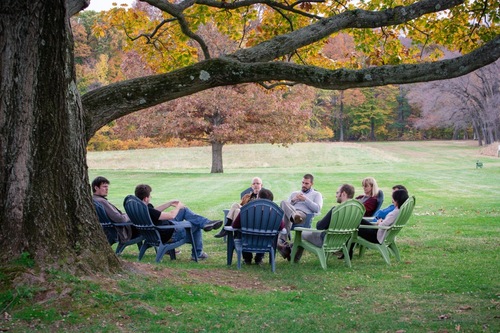ELSI Blog
123 Visiting the EON satellite program at the Institute for Advanced Study in Princeton
Today science, of any kind, is interdisciplinary in nature. All great scientific accomplishments of the last fifty years have been attained by large interdisciplinary teams of scientists working on a common problem. To me, this means that exciting science nowadays is done at the intersection between very diverse disciplines, and typically in large teams. I firmly believe that the future will see research field boundaries blur away. Despite this, much of today's research in numerous universities worldwide is carried out within set boundaries. A large portion (probably the majority) of the academic programs and research institutions we are familiar with are organized in this way, with departments and schools designed around a single discipline. Because of this structure, it becomes more difficult to interact across diverse fields of research.
I am a microbial ecologist working on the microbiology of geothermal environments, and I have been interested in the co-evolution of the biosphere and geosphere for some time now. My work is interdisciplinary in nature, and everyday I interact with geologists, geochemistry and marine chemists among others. Despite this, recently I came to appreciate a completely new dimension of interdisciplinary science.
This past summer I have been granted a new postdoctoral fellowship within the ELSI Origin Network (EON) initiative. I will start my fellowship next spring, but in the meantime Professor Piet Hut, a faculty at the Institute for Advanced Study in Princeton and a principal investigator at ELSI, invited me to visit his Program in Interdisciplinary Studies in Princeton. The Program in Interdisciplinary Studies (or PIDS, as it is known at the Institute) of Piet's is one of the three satellite programs of ELSI, and it is designed to cut across existing disciplines, with a common interest in origin questions. What is the origin of Matter? What is the origin of Life? What is the origin of Consciousness?
I have been lucky enough to visit the program once a week for the past 3 months now, and I came to love the mix of people and disciplines visiting Piet every day. The Institute for Advanced Study is a fantastic place. The atmosphere is welcoming and warm, but quiet and meditative at the same time. A long walk in the surrounding woods is always a good way to clear your mind. There are also numerous occasions to interact during the day: the tasty lunches, the early afternoon tea hour and the informal After Hours presentations. Coming weekly to the Institute is a refreshing break from Rutgers University, where swarms of students and college life noise fill the everyday.
On any given day while visiting the Institute I could find myself chatting at the lunch table with a philosopher, a mathematician working in computer science, a social scientist, a neurobiologist or an astrophysicist, or sit in front of a blackboard with an artificial intelligence scientist and a philosopher talking about awareness of the surrounding and self-awareness and their implications in other disciplines. Every visit brought something new to the mix of people and expertise I met, and challenged and stimulated my own thinking and research in unexpected ways. While spending time visiting PIDS, I realized that one of the hardest tasks of interacting among very different disciplines is the lack of common vocabulary. Piet recognized this problem a long time ago, and the afternoons at PIDS are often filled by small, interactive and informal presentations, where the visitors of the Program can explain basic concepts in their field and frame their research in a broad context to help everyone join the conversation. This greatly enhances interactions, and opens up the possibility to truly interdisciplinary collaborations.
Visiting the PIDS program at the Institute for Advanced Study has pushed me out of my scientific comfort zone, and helped me to embrace the breadth of disciplines and approaches of science. It has deeply influenced the view of my research field and allowed me to frame my research in a broader context. After spending a few months visiting Piet's program in Princeton I am eager to join ELSI and start my new fellowship. I am sure that ELSI's interdisciplinary nature and collaborative atmosphere will further expand my approach to science and significantly influence my research.












